
Journal of Logic Language and Information
Scope & Guideline
Illuminating the Pathways of Thought and Communication
Introduction
Aims and Scopes
- Logic and Language Interactions:
The journal focuses on the interplay between logical frameworks and natural language, investigating how linguistic structures can be represented and analyzed using formal logic. - Computational Approaches to Logic:
There is a strong emphasis on computational models of logic, including the development of algorithms and systems that leverage logical principles for applications in artificial intelligence and language processing. - Philosophical Foundations of Logic:
The journal explores philosophical questions related to logic, such as the nature of inference, truth, and meaning, often addressing classical and non-classical logical systems. - Formal Models in Linguistics:
Research often includes the use of formal models to analyze syntactic and semantic phenomena in natural languages, contributing to the understanding of language structure and function. - Applications of Logic in Information Theory:
The journal also investigates the application of logical methods in information theory, data analysis, and knowledge representation, highlighting the relevance of logic in contemporary computational contexts.
Trending and Emerging
- Integration of Machine Learning with Logic:
There is a rising interest in the intersection of machine learning and logical reasoning, with recent publications exploring how neural models can enhance natural language inference and logical reasoning processes. - Formal Verification and Resource-Bounded Agents:
Research on formal modeling and verification of agents, particularly those with probabilistic and resource-bounded capabilities, has become increasingly prominent, highlighting the importance of logic in artificial intelligence. - Contextual and Dynamic Reasoning:
Emerging themes focus on contextual reasoning and the dynamics of language processing, reflecting a shift towards understanding how context influences logical inference and meaning. - Natural Language Inference and Datasets:
A trend towards systematic surveys and the creation of novel benchmarks for natural language inference has emerged, indicating a growing focus on empirical approaches and data-driven research.
Declining or Waning
- Classical Logic Applications:
There appears to be a decreasing emphasis on traditional applications of classical logic, possibly as researchers shift towards exploring more nuanced or non-classical systems in response to advancements in computational models. - Basic Syllogistic Reasoning:
Research centered on basic syllogistic reasoning has diminished, likely due to the growing complexity of topics that integrate more advanced logical frameworks and computational techniques. - Static Models of Language Processing:
There is a noticeable decline in papers focusing on static models of language processing, as more dynamic and context-sensitive approaches gain prominence in the study of language and logic.
Similar Journals

Logica Universalis
Connecting Scholars through Logic and Applied MathematicsLogica Universalis is an esteemed academic journal published by SPRINGER BASEL AG, dedicated to advancing the fields of Applied Mathematics and Logic. With its ISSN 1661-8297 and E-ISSN 1661-8300, the journal has been active from 2007 and continues to contribute significantly to the discourse surrounding mathematical logic and its applications up to 2024. Located in Basel, Switzerland, Logica Universalis holds a notable position within the academic community, evidenced by its ranking within the Q4 category of both Applied Mathematics and Logic as of 2023. While it currently operates without Open Access options, the journal remains a pivotal resource for researchers and practitioners seeking to explore foundational and applied aspects of logic. Moreover, with a Scopus rank of #22/41 in Logic and #464/635 in Applied Mathematics, it provides a platform for comprehensive knowledge dissemination and facilitates innovative research that bridges theoretical and practical methodologies. This journal is instrumental for anyone looking to deepen their understanding and make meaningful contributions to these intertwined domains.
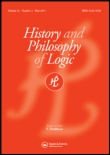
HISTORY AND PHILOSOPHY OF LOGIC
Investigating Logic Through Historical LensesHISTORY AND PHILOSOPHY OF LOGIC is a prestigious journal published by Taylor & Francis Ltd, focusing on the intricate relationships between historical contexts and philosophical inquiries within the realm of logic. With its ISSN 0144-5340 and E-ISSN 1464-5149, the journal has established itself as a vital academic resource since its inception in 1980 and will continue to contribute to the field until 2024. It holds an impressive status, ranking in the Q1 category in History and Q2 in History and Philosophy of Science according to the 2023 category quartiles. This journal is recognized for its high-impact research, achieving notable positions in Scopus ranks, including 80th percentile in Arts and Humanities - History and 58th percentile in History and Philosophy of Science. Although it does not offer open access, it remains a crucial platform for scholars, researchers, and students aiming to explore and advance knowledge at the intersection of logic's history and its philosophical implications.

Logic and Logical Philosophy
Advancing Philosophical Inquiry through LogicLogic and Logical Philosophy is a distinguished journal published by Nicolaus Copernicus University Torun, Poland. With its ISSN 1425-3305 and E-ISSN 2300-9802, the journal has established itself as a premier outlet for cutting-edge research in the field of philosophy, specifically focusing on the intricate intersections of logic and philosophical inquiry. Since its inception, the journal has consistently demonstrated its impact within the academic community, achieving a commendable Q1 ranking in the 2023 Arts and Humanities category, placing it in the 73rd percentile of publications in the field. The journal aims to foster scholarly dialogue and contribute significantly to the advancement of philosophical understanding through rigorous research articles, critical reviews, and discussions. With a commitment to high academic standards and accessibility—though specific access options may vary—Logic and Logical Philosophy remains an essential resource for researchers, professionals, and students alike, paving the way for innovative philosophical discourse until 2024 and beyond.
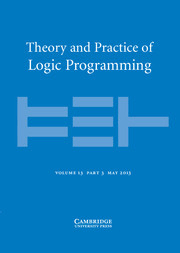
THEORY AND PRACTICE OF LOGIC PROGRAMMING
Elevating Research Standards in Logic Programming.THEORY AND PRACTICE OF LOGIC PROGRAMMING, published by Cambridge University Press, is a premier academic journal that delves into the evolving field of logic programming, offering insights and advancements from 2001 to 2024. With an ISSN of 1471-0684 and an E-ISSN of 1475-3081, this journal serves as a vital resource for researchers, professionals, and students interested in areas such as artificial intelligence, computational theory, and software development. In 2023, the journal was recognized for its excellence, achieving Q1 status in Computational Theory and Mathematics and Q2 in several other categories, underscoring its significant impact within the academic community. Despite not being open access, its robust content, curated by esteemed scholars, guarantees high-quality research and innovative methodologies that are crucial for advancing the field. The journal's rigorous peer-review process and its standings in Scopus rankings further emphasize its relevance and authority, making it a quintessential platform for disseminating key findings and fostering scholarly dialogue.

Logical Methods in Computer Science
Bridging logic and innovation in computer science.Logical Methods in Computer Science is a premier Open Access journal dedicated to fostering scholarly dialogue within the realms of Computer Science and Theoretical Computer Science. Established in 2004 and published by LOGICAL METHODS COMPUTER SCIENCE E V in Germany, this journal aims to bridge theoretical frameworks and practical applications, providing a platform for innovative research and discoveries. With an impressive HIndex reflecting its commitment to high-quality research, Logical Methods in Computer Science has achieved a Q2 ranking in both the miscellaneous and theoretical categories of computer science, indicating its growing influence in the academic community. Researchers, professionals, and students are encouraged to access and engage with the wealth of knowledge this journal offers, which is freely accessible to facilitate widespread dissemination of cutting-edge advancements in logical methods. With its convergence period extending from 2005 to 2024, Logical Methods in Computer Science continues to be a vital resource for those looking to explore the intersections of logic, computation, and mathematics.
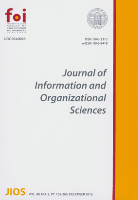
Journal of Information and Organizational Sciences
Advancing knowledge in information and organizational sciences.Journal of Information and Organizational Sciences, published by the University of Zagreb, Faculty of Organization and Informatics, serves as a vital platform in the fields of computer science applications, information systems, and library and information sciences. Since its inception in 2006 as an Open Access journal, it has fostered an inclusive environment for researchers, professionals, and students to engage with the latest scholarly work. With ISSN 1846-3312 and E-ISSN 1846-9418, the journal features diverse studies that contribute to our understanding of organizational dynamics and informatization processes. Although currently categorized in the Q4 and Q3 quartiles across its related fields, the journal's commitment to academic rigor and accessibility aims to inspire greater impact in the scholarly community globally. Positioned in the picturesque city of Varazdin, Croatia, it continues to welcome innovative research that confronts contemporary challenges in information and organizational sciences, thus enhancing its pivotal role in bridging theoretical frameworks with practical applications.

ACTA INFORMATICA
Elevating Software Engineering Standards Globally.ACTA INFORMATICA is a prestigious academic journal published by Springer, dedicated to advancing the fields of computer networks and communications, information systems, and software engineering. With an ISSN of 0001-5903 and an E-ISSN of 1432-0525, the journal has continued to thrive since its inception in 1971 and is set to cover research up until 2024. Although it currently operates within a Q3 category in its respective fields, it is recognized for providing a platform for high-quality, peer-reviewed research, which is essential for fostering innovation and knowledge dissemination in computer science. While it does not offer an open access option, scholars benefit from its rigorous editorial standards and comprehensive coverage of significant trends and methodologies. The journal is conveniently based in New York, NY, USA, further enhancing its accessibility to a global audience. Researchers, professionals, and students alike will find ACTA INFORMATICA a valuable resource for staying abreast of the latest developments and breakthroughs in this vital area of study.
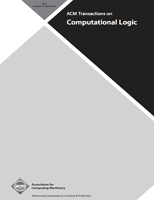
ACM Transactions on Computational Logic
Advancing the Frontiers of Computational LogicACM Transactions on Computational Logic, published by the Association for Computing Machinery, is a premier journal dedicated to the advancement of computational logic, spanning the disciplines of computer science and mathematics. With its ISSN 1529-3785 and E-ISSN 1557-945X, this journal has established itself as a vital resource within the academic community, particularly noted for its influential contributions reflected in its 2023 scopus rankings. The journal holds notable quartile rankings, achieving Q1 in the fields of Computer Science (miscellaneous) and Logic, alongside Q2 in Computational Mathematics and Theoretical Computer Science, indicating its prestigious position in the respective categories. Researchers, practitioners, and students can access a wealth of rigorous research articles that delve into both theoretical frameworks and practical applications of computational logic, fostering innovation and collaboration in the field. As it converges towards its 2024 objectives, ACM Transactions on Computational Logic continues to uphold a commitment to excellence and impact, striving to shape the future of computational theories and methodologies.
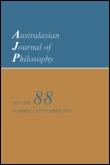
AUSTRALASIAN JOURNAL OF PHILOSOPHY
Championing Scholarly Excellence in PhilosophyAustralasian Journal of Philosophy, published by Routledge Journals, Taylor & Francis Ltd, serves as a premier platform for scholarly discourse in the field of Philosophy. With its origins dating back to 1947, this esteemed journal maintains a rich tradition of fostering high-quality, peer-reviewed research and is recognized for its significant contribution to the philosophy community. Holding a distinguished Q1 ranking in the field for 2023 and standing at #75 out of 806 in the Scopus Arts and Humanities ranking, it occupies a vital niche in advancing philosophical knowledge and inquiry. Although the journal is not open access, it periodically offers articles that contribute to the dissemination of philosophical thought, making it a valuable resource for researchers, professionals, and students alike. The AUSTRALASIAN JOURNAL OF PHILOSOPHY continues to inspire and challenge thinkers worldwide as it presents critical analyses, innovative ideas, and rigorous arguments, ensuring its relevance and importance in contemporary philosophical discussions.
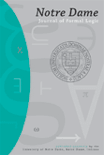
Notre Dame Journal of Formal Logic
Elevating Scholarly Discourse in Formal LogicNotre Dame Journal of Formal Logic is a premier academic publication dedicated to the advancement of research in the field of logical studies. Published by DUKE UNIVERSITY PRESS, this journal has been a significant contributor to the discipline since its inception in 1960, with an impressive convergence of scholarly articles expected to continue through 2024. With its focus on rigorous formal logic, the journal plays a crucial role in fostering discussions that bridge mathematics and philosophical inquiry, holding a notable Q2 ranking in the 2023 Logic category. Despite its non-open-access status, the journal reaches a wide audience of researchers, professionals, and students committed to exploring the foundational aspects of logics. Located in Durham, NC, it provides a platform for innovative thought and critical engagement within the logic community. With its impactful contributions, the Notre Dame Journal of Formal Logic stands as a vital resource for those seeking to deepen their understanding of both classic and contemporary logical theories.